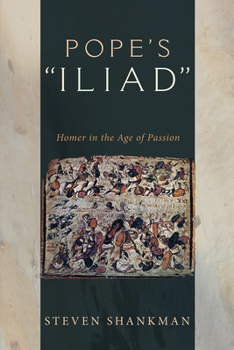Pope's "Iliad"
Select Format
Select Condition 
Book Overview
Explaining why the English Augustan Age could more accurately be called the ""Age of Passion"" than the ""Age of Reason,"" this book recovers the interpretive and stylistic aims of Pope and his contemporaries and addresses objections that have lost Pope's Iliad the audience it deserves. Controversial even before the appearance of the first of its six volumes in 1715, the work remains so today, little read in spite of Samuel Johnson's declaration that it is ""the noblest version translation] of poetry the world has ever seen."" Steven Shankman shows that Pope's translation embodies a much finer understanding of the sense and spirit of the original than has been generally recognized. Examining relevant documents in the history of literary theory and literary style from antiquity through the eighteenth century, Professor Shankman offers a fresh and full interpretation of Pope's achievement. He also redeems some of Pope's shrewdest observations on key difficulties in the interpretation of Homer. The English Augustan poets could proudly say that, although many of their works were matched or surpassed by ancient Greece and Rome or by more contemporary Italy and France, they alone raised poetic translation to the status of great art. This book illuminates their accomplishment, and it has important implications for problems of literary translation that we face today.
Format:Paperback
Language:English
ISBN:1606088084
ISBN13:9781606088081
Release Date:June 2009
Publisher:Wipf & Stock Publishers
Length:214 Pages
Weight:0.60 lbs.
Dimensions:0.5" x 5.4" x 8.3"
Customer Reviews
0 rating





